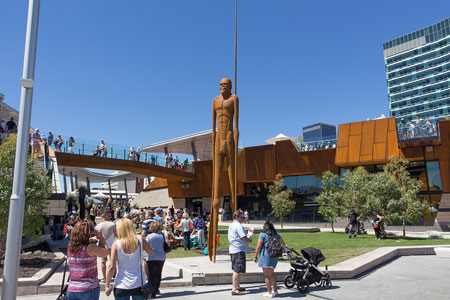Korean Financial Translation Services
Perth Translation Services » Korean Translator » Korean Financial Translation Service
Korean Financial Document Translation
Perth Translation provides professional translation service for Korean financial documents. All financial, business and legal documents for translation are handled by professional Korean translators and treated in strict confidence.
To get started, upload your documents using the form on this page, or send us the document for quick quote and time-estimate » [email protected]
Upload your documents

About the Korean Language
The Korean language (Korean), is spoken mainly in North and South Korea. It is spoken by more than 78 million people (most of whom are North or South Koreans).
In South Korea, the Korean language is called hangukmal (한국말) or hangugeo (Hangeul: 한국어, Hanja: 韓國語). In North Korea, however, it is called choseonmal (조선말) or choseoneo (조선어, 朝鮮語).
Modern Korean descends from Middle Korean, which in turn descends from Old Korean, which descends from the Proto-Koreanic language which is generally suggested to have its linguistic homeland somewhere in Manchuria. Whitman (2012) suggests that the proto-Koreans, already present in northern Korea, expanded into the southern part of the Korean Peninsula at around 300 BCe and coexist with the descendants of the Japonic Mumun cultivators (or assimilated them). Both had influence on each other and a later founder effect diminished the internal variety of both language families.
Chinese characters arrived in Korea (see Sino-Xenic pronunciations for further information) together with Buddhism during the Proto-Three Kingdoms era in the 1st century BC. It was adapted for Korean and became known as Hanja, and remained as the main script for writing Korean through over a millennium alongside various phonetic scripts that were later invented such as Idu, Gugyeol and Hyangchal. Mainly privileged elites were educated to read and write in Hanja. However, most of the population was illiterate. In the 15th century, King Sejong the Great personally developed an alphabetic featural writing system known today as Hangul. He felt that Hanja was inadequate to write Korean and that this was the cause of its very restricted use; Hangul was designed to either aid in reading Hanja or replace Hanja entirely. Introduced in the document "Hunminjeongeum", it was called "eonmun" (colloquial script) and quickly spread nationwide to increase literacy in Korea. Hangul was widely used by all the Korean classes but often treated as "amkeul" (script for female) and disregarded by privileged elites, whereas Hanja was regarded as "jinseo" (true text). Consequently, official documents were always written in Hanja during the Joseon era. Since most people couldn't understand Hanja, Korean kings sometimes released public notices entirely written in Hangul as early as the 16th century for all Korean classes, including uneducated peasants and slaves. By the 17th century, Korean elites Yangban and their slaves exchanged Hangul letters; that indicates a high literacy rate of Hangul during the Joseon era. Today, Hanja is largely unused in everyday life due to its inconvenience, but it is still important for historical and linguistic studies. Neither South Korea or North Korea opposes the learning of Hanja, though they are not officially used in North Korea anymore, and their usage in South Korea is mainly reserved for specific circumstances, such as newspapers, scholarly papers, and disambiguation.
Since the Korean War, through 70 years of separation, the North–South differences have developed in standard Korean, including variations in pronunciation and vocabulary chosen, but these minor differences can be found in any of the Korean dialects and still largely mutually intelligible.
Korean Translator Services
We provide both Korean to English translation and English to Korean translations by professional Korean translators based in Australia.
- Korean translator for driving licence translation
- Korean translator for financial document translation
- Korean translator for bank statement translation
- Korean translator for birth certificate translation
- Korean translator for marriage certificate translation
- Korean translator for name-change certificate translation
- Korean translator for degree translation
- Korean translator for diploma translation
- Korean translator for employment record translation
- Korean translator for school transcript translation
- Korean translator for passport translation
- Korean translator for police report translation
- Korean translator for no-criminal record translation
- Korean translator for personal letters and cards
- Korean translator for utility bill translation
- Korean translator for death certificate translation
- Korean translator for medical record translation
- Korean translator for legal document translation service
- Korean translator for AHPRA
- Korean translator for Engineers Australia
- Korean translator for IMMI, DFAT
- Korean English translator for UAC
- Korean to English translation for local Australian universities
- English to Korean translation for overseas universities
Korean translation services - For all requests, email us for a quick quote.
Professional Korean Translator Services
- Korean translator for agriculture, forestry and fisheries industries
- Korean translator for automotive engineering translation
- Korean translator for advertising and marketing translation
- Korean translator for biomedical engineering translation
- Korean translator for aged care and child care facilities
- Korean translator for educational document translation
- Korean translator for employee induction and training document translation
- Korean translator for migration document translation
- Korean translator for energy, mining and resources industries
- Korean translator for medical translation
- Korean translator for legal document translation
- Korean translator for financial translation
- Korean translator for school letters to parents
- Korean translator for technical translation
- Korean translation service for brochures and flyers, working in design files such as Adobe InDesign, Illustrator, PowerPoint or Publisher (DTP Services)
- Korean brochure translation and typesetting services

